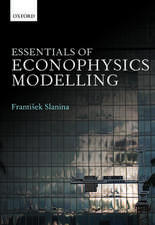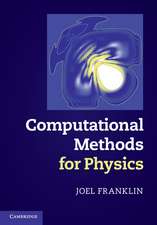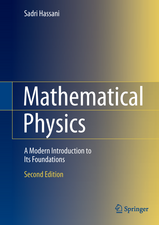Maxwell's Demon 2 Entropy, Classical and Quantum Information, Computing
Editat de Harvey Leffen Limba Engleză Paperback – 13 dec 2002
Since the publication of Maxwell's Demon: Entropy, Information, Computing in 1990, Maxwell's demon has been the subject of renewed and increased interest by numerous researchers in the fields mentioned above. Updated and expanded, Maxwell's Demon 2: Entropy, Classical and Quantum Information, Computing retains many of the seminal papers that appeared in the first edition, including the original thoughts of James Clerk Maxwell and William Thomson; a historical review by Martin Klein; and key articles by Leo Szilard, Leon Brillouin, Rolf Landauer, and Charles Bennett that led to new branches of research on the demon. This second edition contains newer articles by Landauer, Bennett, and others, related to Landauer's principle; connections with quantum mechanics; algorithmic information; and the thermodynamics and limits of computation. The book also includes two separate bibliographies: an alphabetical listing by author and a chronological bibliography that is annotated by the editors and contains selected quotes from the books and articles listed. The bibliography has more than doubled in size since publication of the first edition and now contains over 570 entries.
| Toate formatele și edițiile | Preț | Express |
|---|---|---|
| Paperback (1) | 724.35 lei 6-8 săpt. | |
| CRC Press – 13 dec 2002 | 724.35 lei 6-8 săpt. | |
| Hardback (1) | 1041.50 lei 6-8 săpt. | |
| CRC Press – 28 iun 2018 | 1041.50 lei 6-8 săpt. |
Preț: 724.35 lei
Preț vechi: 905.45 lei
-20% Nou
Puncte Express: 1087
Preț estimativ în valută:
138.60€ • 144.72$ • 114.45£
138.60€ • 144.72$ • 114.45£
Carte tipărită la comandă
Livrare economică 15-29 aprilie
Preluare comenzi: 021 569.72.76
Specificații
ISBN-13: 9780750307598
ISBN-10: 0750307595
Pagini: 504
Dimensiuni: 178 x 254 x 29 mm
Greutate: 1.02 kg
Ediția:1
Editura: CRC Press
Colecția CRC Press
ISBN-10: 0750307595
Pagini: 504
Dimensiuni: 178 x 254 x 29 mm
Greutate: 1.02 kg
Ediția:1
Editura: CRC Press
Colecția CRC Press
Public țintă
ProfessionalCuprins
Overview. Early History and Philosophical Considerations. Smoluchowski Trap Doors and Information Acquisition. Information Erasure: Landauer's Principle. Quantum Nuances. Algorithmic Information. Computation: Thermodynamics and Limits.
Recenzii
"MD2 is an excellent presentation of the dominant approach to the Demon in recent years. It is the second, greatly revised, edition of a collection that appeared in 1990 (hereafter MD1) and contributed significantly to the Demon's recent popularity. Let me conclude by highly recommending MD2 as an introduction to mainstream Demonology: its introduction is a very good outline of this approach, the reprinted articles are among the most influential in their fields, and the comprehensive annotated bibliography is a tool without which-since MD1 came out in 1990-work in the field can hardly be imagined."
-Orly R. Shenker, Studies in History and Philosophy of Modern Physics, Volume 35, Issue 3
-Orly R. Shenker, Studies in History and Philosophy of Modern Physics, Volume 35, Issue 3
Descriere
Since the publication of Maxwell's Demon: Entropy, Information, Computing, Maxwell's demon has been the subject of renewed and increased interest by numerous researchers. Updated and expanded, Maxwell's Demon 2 retains many of the seminal papers that appeared in the first edition, including key articles by Leo Szilard, Leon Brillouin, Rolf Landauer, and Charles Bennett that led to new branches of research on the demon. This second edition contains newer articles relating to Landauer's principle, connections with quantum mechanics, algorithmic information, and the thermodynamics and limits of computation. Expanded information is also included in the bibliography.












